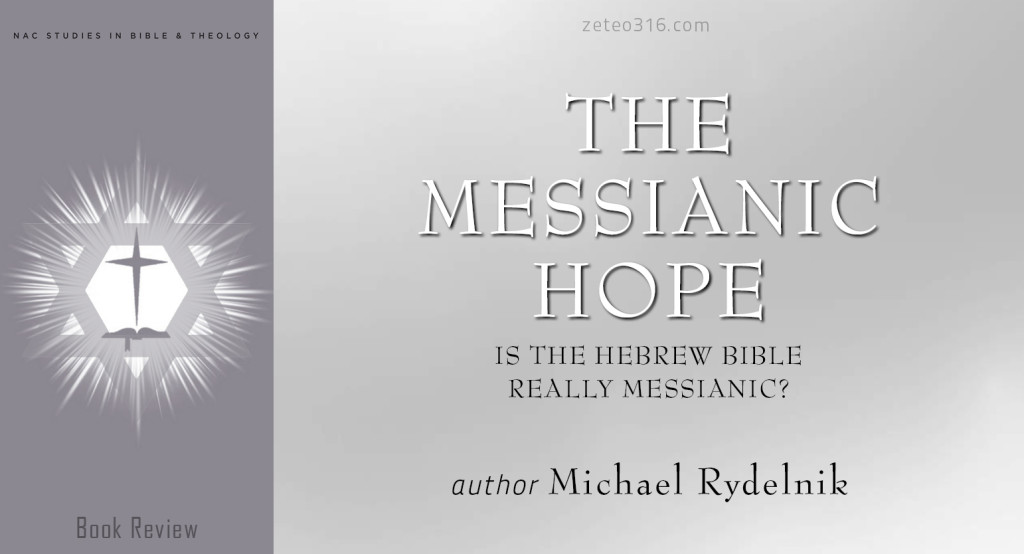A review of the book,
The Messianic Hope: Is the Hebrew Bible Really Messianic? (<<— affiliate link)
by Dr. Michael Rydelnik. Hardcover published by B & H Publishing, 206 pages.
In a review of Michael Heiser’s book The Unseen Realm, I mentioned how he dismissed Gen 3:15 as a messianic passage. He didn’t make a great argument against it and I grant that it wasn’t the focus of his book. However, the fact that he did so highlights the fact that some scholars – for whatever their reasons – do question messianic passages.
People like Walter Kaiser, John Sailhamer, Michael Rydelnik and E. W. Hengstenberg etc do see Gen 3:15 as a messianic passage. Personally, I don’t see how one could overlook the obvious context. Rydelnik has a whole chapter (Chapter 9) dealing with the proto-evangelium controversy. I think his arguments are compelling.
The title of the book really speaks for itself. And, in my opinion, the best introduction and review of this book is by Pastor Dan Phillips. It was his review which convinced me to get the book. I happily endorse his thoughts. Dan begins recounting his disappointment upon reading a noted scholar’s bio of the Apostle Paul and his take on messianic texts. Dan asks whether the OT really predicts the person and work of Jesus Christ:
Enter Michael Rydelnik. The son of Orthodox Jewish parents (more on that shortly), Rydelnik earned a diploma in Jewish Studies from Moody Bible Institute, a B.A. degree from Azusa Pacific University, a Th.M. from Dallas Theological Seminary, a D. Miss. from Trinity International University. He has taught at Moody, Dallas, Criswell, and Talbot. Rydelnik is the author of a number of journal articles and chapters in books, as well as working in the translation of the HCSB and notes in the HCSB Study Bible.
The book’s burden. Michael Rydelnik makes the case that the Old Testament not only contains many direct Messianic prophecies, but itself is an eschatological, Messianic book, wholly pointing forward to Jesus the Messiah. In Rydelnik’s words, This book argues that reading the Old Testament according to its compositional strategies and canonical shape will yield a clear messianic intent, with far more direct messianic prediction than is commonly held (33) …literal prediction and direct fulfillment are common and to be expected in the Old and New Testaments (99)
Here is my point…in the whole book: beginning with Jesus, moving to the apostolic period, and continuing until today, the message of Messiah has been proclaimed by using messianic prophecy. It is a foundational element for identifying Jesus as the true Messiah. …the views of the modern academy have made their way into evangelical scholarship, leading to a minimization or even a denial of messianic prediction. Evangelical scholarship must rethink this trend…. (190)…keep reading
Don’t forget to read the comments at the end of Dan’s review.
One of my favorite chapters was the last one (Chapter 12). Dr. Michael Rydelnik (a former Orthodox Jew) recounts a personal story when, as a young inexperienced student, he attempted to publicly defend his faith in Yeshua the Messiah. His Jewish opponent was older and more experienced. The encounter left young Michael disappointed and distressed. He felt he’d failed. The incident haunted him for 32 years…until he had a different encounter. But you’ll have to read the book to find out.
Contents
1) Introduction. Why Messianic Prophecy is Important
2) The Nature of Prophecy and Fulfillment: How Old Testament Scholarship Views Messianic Prophecy
3) Text-Critical Perspectives on Messianic Prophecy
4) Innerbiblical Perspectives on Messianic Prophecy
5) Canonical Perspectives on Messianic Prophecy
6) New Testament Perspectives on Messianic Prophecy
7) Decoding the Hebrew Bible: How the New Testament Reads the Old
8) Rashi’s Influence on the Interpretation of Messianic Prophecy
9) An Example from the Law: Interpreting Gen 3:15 as a Messianic Prophecy
10) An Example from the Prophets: Interpreting Isaiah 7:14 as a Messianic Prophecy
11) An Example from the Writings: Interpreting Psalm 110 as a Messianic Prophecy
12) Conclusion: A Call to Return to the Messianic Hope
Note the importance of Chapter 8 where Rashi’s non-literal Jewish interpretations are discussed. Dr. Rydelnik demonstrates how Rashi’s methods negatively influenced Christian interpretations.
Rydelnik’s book is a sterling defense of the Messianic Hope within the Old Testament and one that all Christians should read.
Purchase Michael Rydelnik’s
The Messianic Hope !
Disclosure: This link is an affiliate link meaning, at no additional cost to you, we may get a commission if you make a purchase. Thanks for your support in this way!
Read our Full Disclosure policy here.
The Messianic Hope: Is the Hebrew Bible Really Messianic? (NAC Studies in Bible & Theology)


